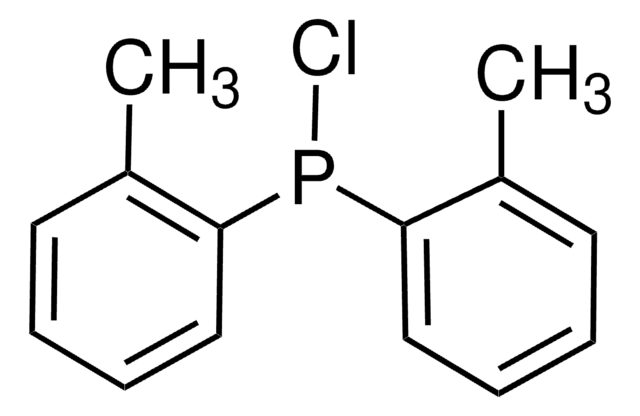481408
Chlorodicyclohexylphosphine
97%
Synonym(s):
Dicyclohexylchlorophosphine, Dicyclohexylphosphine chloride, Dicyclohexylphosphinous chloride
About This Item
Recommended Products
Assay
97%
reaction suitability
reaction type: Buchwald-Hartwig Cross Coupling Reaction
reaction type: Heck Reaction
reaction type: Hiyama Coupling
reaction type: Negishi Coupling
reaction type: Sonogashira Coupling
reaction type: Stille Coupling
reaction type: Suzuki-Miyaura Coupling
reagent type: ligand
refractive index
n20/D 1.533 (lit.)
bp
165 °C/12 mmHg (lit.)
density
1.054 g/mL at 25 °C (lit.)
functional group
phosphine
SMILES string
ClP(C1CCCCC1)C2CCCCC2
InChI
1S/C12H22ClP/c13-14(11-7-3-1-4-8-11)12-9-5-2-6-10-12/h11-12H,1-10H2
InChI key
AKJFBIZAEPTXIL-UHFFFAOYSA-N
Application
- 1,2-Bis(dicyclohexylphosphinoxy)ethane ligand by reacting with ethylene glycol in the presence of triethylamine via Michaelis−Arbuzov type rearrangements.
- 1,1,2,2-tetracyclohexyldiphosphine monosulfide ligand by treating with LiS.
It can be also used as a starting material for the preparation of some other ligands such as dicyclohexylphosphine oxide , phosphino substituted N-aryl pyrroles , di-tert-butyl((dicyclohexylphosphino)methyl)phosphine , dicyclohexylcyclopentylphosphine. These ligands are used in Pd-catalyzed cross-coupling reactions.
Signal Word
Danger
Hazard Statements
Precautionary Statements
Hazard Classifications
Eye Dam. 1 - Skin Corr. 1B
Supplementary Hazards
Storage Class Code
8A - Combustible corrosive hazardous materials
WGK
WGK 3
Flash Point(F)
235.4 °F - closed cup
Flash Point(C)
113 °C - closed cup
Personal Protective Equipment
Certificates of Analysis (COA)
Search for Certificates of Analysis (COA) by entering the products Lot/Batch Number. Lot and Batch Numbers can be found on a product’s label following the words ‘Lot’ or ‘Batch’.
Already Own This Product?
Find documentation for the products that you have recently purchased in the Document Library.
Customers Also Viewed
Our team of scientists has experience in all areas of research including Life Science, Material Science, Chemical Synthesis, Chromatography, Analytical and many others.
Contact Technical Service











